Sarah Ens
The World is Mostly Sky
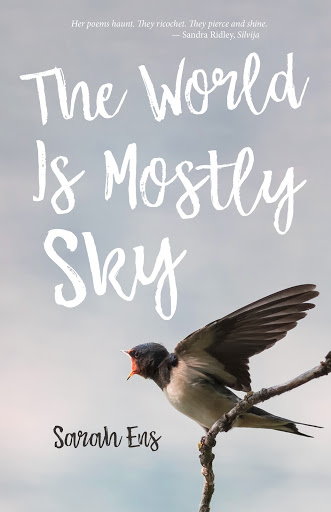
In this shining debut, identity and community converge. Beginning with the open prairie skies of her youth, Sarah Ens maps an emergence into millennial womanhood, questioning feminine expectations and examining heartache and disembodiment during an age of personal and planetary upheaval. The World Is Mostly Sky looks backwards and inwards to find respite in stars, warm earth, and deep waters while rejoicing in the sacred bonds of sisterhood that offer the courage to meet our uncertain horizon.
Sarah Ens grew up in Treaty 1 territory (Landmark, MB) and is currently a writer and editor based in Treaty 6 territory (Saskatoon, SK). In 2019, she won The New Quarterly's Edna Staebler Personal Essay Contest and placed 2nd in Contemporary Verse 2's 2-Day Poem Contest. She also won 1st place in Room Magazine's 2018 Short Forms Contest. She is a current MFA in Writing candidate at the University of Saskatchewan and her debut collection of poetry, The World Is Mostly Sky, launched April 15, 2020 with Turnstone Press.
Adam Dickinson
Anatomic
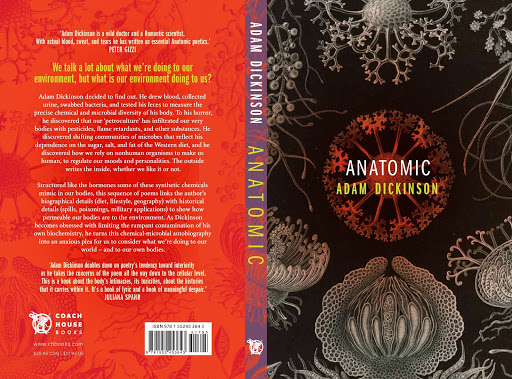
The poems of Anatomic have emerged from biomonitoring and microbiome testing on the author's body to examine the way the outside writes the inside, whether we like it or not. Adam Dickinson drew blood, collected urine, swabbed bacteria, and tested his feces to measure the precise chemical and microbial diversity of his body.
Structured like the hormones some of these synthetic chemicals mimic in our bodies, this sequence of poems links the author's biographical details (diet, lifestyle, geography) with historical details (spills, poisonings, military applications) to show how permeable our bodies are to the environment. As Dickinson becomes obsessed with limiting the rampant contamination of his own biochemistry, he turns this chemical-microbial autobiography into an anxious plea for us to consider what we're doing to our world—and to our own bodies.
Adam Dickinson is the author of four books of poetry. His work has been nominated for awards including the Governor General's Award for Poetry, the Trillium Book Award for Poetry, and the Raymond Souster Award. He was also a finalist for the Canadian Broadcasting Corporation (CBC) Poetry Prize and the K.M. Hunter Artist Award in Literature. He teaches Creative Writing at Brock University in St. Catharines, Ontario.Kelly Shepherd
Insomnia Bird
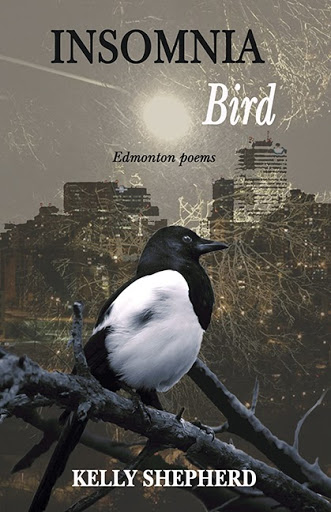
Insomnia Bird: Edmonton Poems looks at the shadow geography of the city: things overlooked, ignored, forgotten, suppressed, buried. The poems are made, magpie nest-like, using found materials including literature, folklore, and history, as well as official Edmonton website and planning documents. The book is loosely divided into three sections: public transit, urban wildlife, and construction work.
Kelly Shepherd's second poetry collection, Insomnia Bird: Edmonton Poems (Thistledown Press, 2018) won the 2019 Robert Kroetsch City of Edmonton Book Prize, and was shortlisted for the 2019 Stephan G. Stephansson Award for Poetry. Kelly has written seven chapbooks, and he is the poetry editor for the environmental philosophy journal The Trumpeter. Originally from Smithers, BC, Kelly lives and teaches in Edmonton.
Conrad Scott
Waterline Immersion
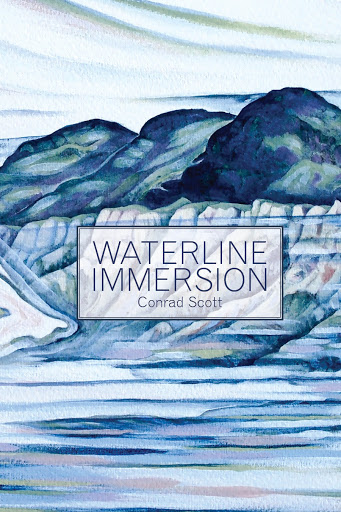
Diversely interweaving the Norse creation myth, colonial Contact with North America, and stories about his grandparents, Conrad Scott's Waterline Immersion asks fundamental questions about how to understand a place. The writer's genealogical lines join in the river valleys of Kamloops, British Columbia – the cartographic point where the North and South Thompson rivers meet on their journey away, to the Pacific. Yet Waterline Immersion delves deeper than surface geography and personal history, dredging for cultural stories and environmental futures of the waterways present today.
Conrad Scott, writer and academic, is a graduate of the 2010 Spring Writing Studio at the Banff Centre for the Arts. Waterline Immersion, his first poetry collection, was published by Frontenac House Press in 2019. His poetry has appeared in such publications as Freefall Magazine and The Enpipe Line and his creative work takes a step to the side and urges us to look askance at our society and our sense of place in the world. He is currently working on a second poetry collection, and a novel set in the near future.
Joanna Lilley
Endlings
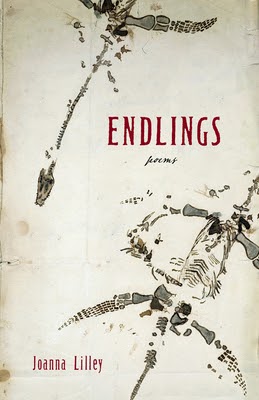
Endlings takes us across continents and through the long expanse of aeons to give voice to the dead. In poems that are lyrical, exact, and deeply melancholic, Joanna Lilley demands audience for the final moments of animal extinction. From the zebra-horse quagga and chiding dodo, to the giant woolly mammoth and delicate Xerces Blue Butterfly, the haunting, urgent words of these "endlings" cut to the bone to expose the brutality of Nature and the devastating repercussions of human ignorance and intent, while giving hope that our humanity will help save what remains.
"We are so disconnected from nature we think it's the economy that makes our lifestyles and lives possible. In fact it's the complex web of nature within which we are inextricably linked and on which we are utterly dependent. When a species disappears, that complex web of life loses resilience and productivity. This book is a call to what we have lost within human memory. It's a frightening reminder that Nature is our Mother and source of life."
—David Suzuki
"Endlings moved and changed me. Joanna Lilley's clear vision and assured craft affirm that it's too late for the passenger pigeon, nearly for the northern white rhinoceros, but not for the living and not for art. 'Perhaps we can augment / our aptitude for wonder,' Lilley ventures. In honouring the lost, these poems invite and sometimes command us to attend and to mourn. To embrace their wonder is to commit to living differently."
—Stephanie Bolster, A Page from the Wonders of Life on Earth
"Endlings offers an untold history from the voices of extinct and extant animals. Watch as a boy shoots the last Labrador duck out of hunger, and cringe. Be condemned by the dodo and the ivory-billed woodpecker; condemned for the things that have died without us even knowing. Joanna Lilley gives the mythology of lost creatures and shows how myth can blind. Careful of what is underfoot, she reminds, it may be an endling."
—Yvonne Blomer, As if a Raven
Joanna Lilley is the author of three poetry collections: Endlings (Turnstone Press), If There Were Roads (Turnstone Press) and The Fleece Era (Brick Books) which was nominated for the Fred Cogswell Award for Excellence in Poetry. Her novel, Worry Stones (Ronsdale Press), was longlisted for the Caledonia Novel Award and she's also the author of a short story collection, The Birthday Books (Hagios Press). Joanna has given readings and workshops as far afield as Alaska and Iceland. From Britain, Joanna now lives in Whitehorse, Yukon, on the Traditional Territories of the Kwanlin Dün First Nation and the Ta'an Kwäch'än Council. Find Joanna online at www.joannalilley.com.
Poets from Sweet Water: Poems for the Watersheds
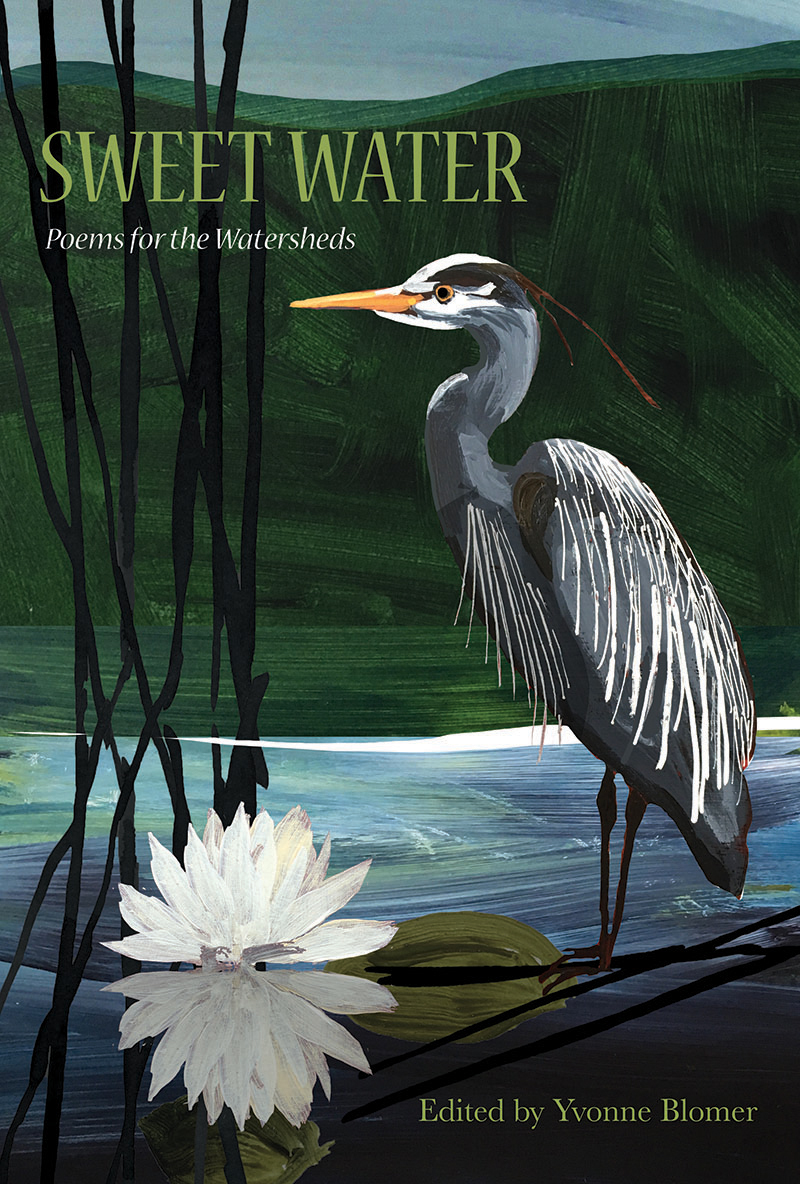
Susan Alexander's second book of poems, Nothing You Can Carry, will be released by Thistledown Press September 2020. Her poems have garnered literary awards such as the 2019 Mitchell Prize, Vancouver Writer's Festival Poetry Prize, Whistler's Poet's Pause and the Short Grain prize and appeared in anthologies and several literary magazines in Canada and the U.K. as well as on Vancouver busses and in the Alta Lake woods.
Lee Beavington is a river walker, forest seeker, and island dweller. He is an award-winning author, educator and PhD candidate in Philosophy of Education at SFU. His interdisciplinary research explores environmental ethics and contemplative science education. He has taught in five faculties at KPU. More about Lee at www.leebeavington.com.
Christine Lowthe's poetry books are New Power, My Nature and Half-Blood Poems. Her memoir Born Out of This was shortlisted for a BC Book Prize. She won the inaugural Rainy Coast Arts Award for Significant Accomplishment from the Pacific Rim Arts Society and is currently Poet Laureate of Tofino on the west coast of Vancouver Island.
Elee Kraljii Gardiner is the author of the poetry books Trauma Head and serpentine loop, and the anthologies Against Death: 35 Essays on Living and V6A: Writing from Vancouver's Downtown Eastside. She is an Associate Director of Vancouver Manuscript Intensive. Originally from Boston, Elee now lives in Vancouver on the traditional and unceded territories of the Squamish, Tsleil-Waututh and Musqueam Peoples. eleekg.com
Lorri Neilsen Glenn's most recent book is Following the River: Traces of Red River Women, a lyric memoir of her Indigenous grandmothers and their contemporaries (Treaties 1 and 5). Former Halifax Poet Laureate, Lorri is Professor Emerita (MSVU) and a mentor The University of King's College MFA's program in creative nonfiction.
Kevin Spenst is the author of Ignite, Jabbering with Bing Bong, and Hearts Amok: a Memoir in Verse (all with Anvil Press), and over a dozen chapbooks including Pray Goodbye (the Alfred Gustav Press), Ward Notes (the serif of nottingham), Surrey Sonnets (JackPine Press), and most recently Upend (Frog Hollow Press: Dis/Ability series). He lives in Vancouver on unceded Coast Salish territory with the love of his life Shauna Kaendo.